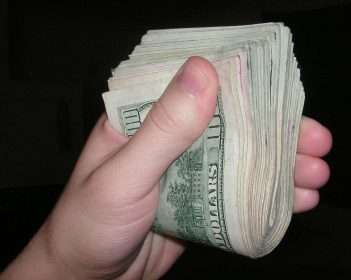No More Cash at MGM Cash Game Tables
Have you ever dreamt about being a bad-ass and imagined yourself strutting up to a poker table, whipping out a four-inch thick roll of hundred dollar bills, flipping it onto the table, and saying, calmly, “Deal me in.”
Well, if you still want to live that fantasy, you had better get moving, because in the United States, at least, your hopes will soon be dashed. According to a report from Chris Grove at OnlinePokerReport.com (OPR), the MGM Resorts properties in the U.S. will no longer allow cash to play at its poker tables, effective April 1st. The list of properties includes ARIA, Bellagio, MGM Grand Las Vegas, Mandalay Bay, Luxor, Excalibur, Monte Carlo, and The Mirage in Las Vegas, the Beau Rivage in Biloxi, Mississippi, and the MGM Grand Detroit.

MGM Grand
Image courtesy: mgmgrand.com
For those unfamiliar with brick-and-mortar cash games, what the term “cash plays” means is that a player can use actual paper folding money at a ring game table instead of chips. At MGM properties, $100 bills have been permitted, so it has not been uncommon to see someone with a stack Benjamins next to a stack of chips.
MGM has not explained why it is making the change, but Grove and others opine that it probably has something to do with the U.S. Department of the Treasury’s Financial Crimes Enforcement Network (FinCEN) ramping up its efforts in the last year to combat money laundering at casinos. For example, in a recent letter to Geoff Freeman, the President and CEO of the American Gaming Association, FinCEN Associate Director Jamal El-Hindi wrote about the problems third-party sports betting poses to anti-money laundering efforts:
FinCEN understands that certain organizations and individuals have been circumventing various laws related to sports betting. More specifically, criminals are making bets with legally operating sports books, including by using intermediaries to place bets on behalf of unidentified third parties (third-party betting). In these cases, the intermediaries rarely voluntarily disclose to the casino that a transaction is being conducted on behalf of a third party, thereby disguising the third party’s role in the transaction and obscuring the source of funds used to place the bet. This poses distinct money laundering risks for casinos.
Of course, this does not have to do with poker, though there was fear that Nevada SB 40, introduced in December to make third-party sports betting in Nevada casinos illegal, would make poker staking illegal as well (it won’t). It does, however, speak to FinCEN’s concern with money laundering in brick-and-mortar gambling venues.
More to the point, Jennifer Shasky Calvery, Director of FinCEN, spoke at the 2014 Bank Secrecy Act Conference in 2014, saying, in part:
But casinos are not simple cash intensive businesses. They are not arcades. They are complex financial institutions with intricate operations that extend credit, and that conduct millions of dollars of transactions every day. They cater to millions of customers with their bets, markers, and redemptions. And casinos must continue their progress in thinking more like other financial institutions to identify AML risks. Not only is this thinking necessary to safeguard your corner of the financial sector, but it is also something that should be good for your individual business too.
Think about what happens each time a customer enters your casino. Often, the first thing a customer does is conduct a financial transaction – they buy chips. And the last action a customer takes is usually also a financial transaction – they cash out those chips. And while the vast majority of these transactions are purely for entertainment purposes, casinos can serve as the vehicle for the use, movement, and concealment of ill-gotten gains. This is a risk inherent in all financial institutions.
The interesting thing about poker is that in games where cash plays, it is one of the only ways someone could wager large amounts of money and both win and lose without the money being traceable, except if one combed through security footage. In table games, cash must be converted to chips to play and then converted back to cash to be spent outside the casino. The casinos can and do track these transactions quite easily. Slots and video poker machines use cash, but as those are computers, they, too, track every deposit and win. Poker players with wads of cash, though, could put their money on the table, gamble, and then walk away with different sums of cash without anyone knowing how much anyone had.
While money laundering isn’t as simple as just having the will to do it, if there was one avenue to get it done in a casino, it would be at a poker table where cash plays. Of course, it would still likely require successful collusion with another player or group of players and it would have to go on undetected by casino staff and security, but unrecorded cash transactions certainly open up the possibility.

















COMMENTS